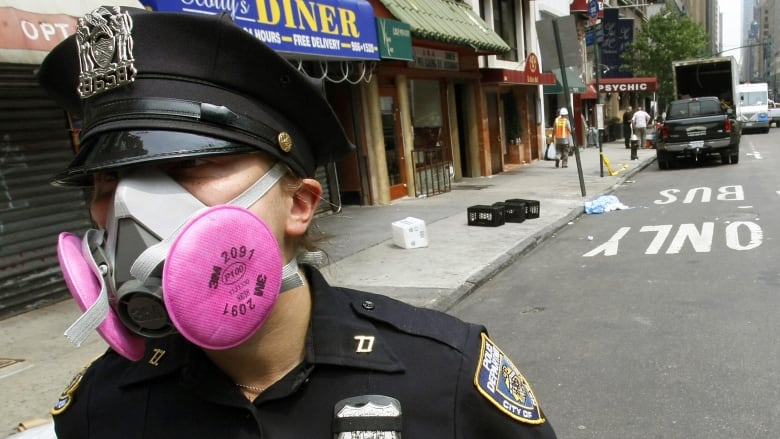Winnipeg Police Service risking officer safety to save money on masks, union says
Union files grievance over decision to equip members with disposable masks to protect from drug exposure

Winnipeg's police union has filed a grievance over safety and the fentanyl crisis, saying the police service is resorting to cheaper disposable protective masks due to its budget crunch.
And to ensure the mask has a proper fit, hundreds of officers — the general patrol ones who are often the first responders to a scene — have been told to shave their facial hair.
"They're not very happy about it. There are a lot of members who did sport facial hair for various reasons and now that they are being told to shave, it is a little bit of a concern," said Maurice Sabourin, president of the Winnipeg Police Association.
"But they are complying because safety, obviously, is the main concern."
However, he says the police service doesn't seem to be putting the same level of concern into the officers' safety — otherwise, Sabourin says, it would issue respirators with replaceable filters and cartridges rather than a cheap, disposable dust mask like those worn while working with drywall.
"It's just a paper filter, is what it is," he said, adding the masks don't always seal properly, putting officers at risk.
In comparison, the non-disposable respirator is silicone-based and more secure, he said.

"Obviously the paper one is a cheaper version of the non-disposable [respirators] that can range anywhere from $60 to $80, where the paper ones are, I think, readily available at any autobody shop for something like $3," Sabourin said.
"I understand that the service is under a budget crunch as a result of Mayor Bowman's budget, but we still think the members should be outfitted with the best possible equipment."
Police service spokesman Const. Rob Carver disagrees that officer safety is being taken lightly. In recent years, the service has outfitted officers with body armour, Naloxone kits and slash-proof gloves, as well as protective latex and nitrile gloves to help them deal safely in various situations.
- 3 Winnipeg police officers self-administer naloxone after possible fentanyl exposure
- Winnipeg police armed with life-saving fentanyl overdose antidote
- Fentanyl 'killing people from across the city,' firefighters say
Officers were given a presentation on fentanyl and carfentanil dangers by a doctor from the Winnipeg Regional Health Authority, who said the disposable masks are the ones they use when they feel they might be exposed to the drugs, Carver said, noting the city's firefighter paramedics use the same one.
A lot of research was done, he said, adding officers have had training sessions on properly fitting the masks — which is also why the officers need to shave.
"Almost no one with facial hair is able to pass," he said, noting the firefighter paramedics also have a no-facial-hair policy.

The disposable masks are also smaller than respirators and so can be carried by officers at all times. So if they face a threat, they don't need to run back to a cruiser to get a respirator, Carver said.
"Officer safety is absolutely critical. It is always at the foremost of the concerns of the Winnipeg Police Service."
Although Winnipeg officers have been trained "in a laboratory setting" to wear the disposable mask properly, "the problem with it is, once they're on the street, there is no way to do either a negative or a positive pressure check on the mask to ensure you have a good seal," Sabourin said.
"That gives us great concern, especially when members are involved in high-stress situations."
The respirator, on the other hand, allows the user to put their hand over the filter and do a negative pressure test — breathe in and the mask will compress on the face, Sabourin explained.
"If you don't have a good seal, it won't compress."
- Man dies of suspected fentanyl overdose in South Osborne
- Fentanyl deaths have nearly doubled in Manitoba over 2 years
- 3 people dead from suspected fentanyl overdoses at Winnipeg home
And for officers dealing with opioids like fentanyl and carfentanil, a tight fit is imperative, he said, noting the lethal dosage is extremely small.
For carfentanil, an amount the size of a grain of sand can be fatal.
"So if you are in an atmosphere where the powder has dispersed into the air, it's very likely that you could breathe in the lethal dose," Sabourin said.
He says the grievance is set to be heard by a third party in September.